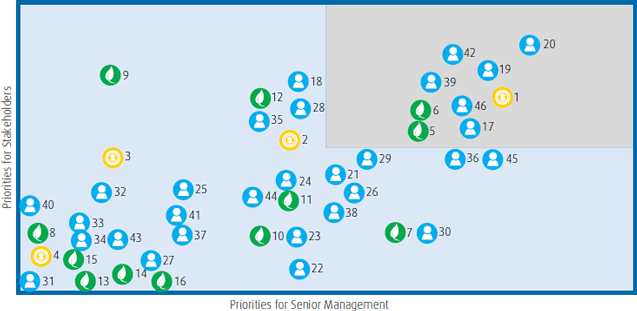
About this Report
ACCORDANCE’ –
CORE OPTION
This report was published only electronically in line with our commitment to the environment.
![]()
For further information or clarification, please contact:
Erika Marques Andrade
Investor Relations Department
e-mail: ri@algartelecom.com.br
Rua José Alves Garcia, 415 – Uberlândia, Minas Gerais, Brazil
Our commitment to transparency and sustainable business practices is reflected in this Sustainability Report, published for the ninth straight year. Following the Global Reporting Initiative’s (GRI) guidelines, version G4, we prepared this report in accordance with the Core option.
In addition to the main highlights in the year, information about our management, performance indicators, and profile and governance items is distributed throughout the sections “Relationships” and “Sustainable,” and put together in the GRI Index at the end of the report.
The information contained here covers Algar Telecom’ and its subsidiaries’ performance between January 1 and December 31, 2014. Where applicable, the indicators may be compared to those of 2013 and 2012, reported in previous versions. Some indicators such as G4-EN3 and G4-EN4 were revised owing to changes in measurement criteria; as a result, this year’s report brings restated numbers posted in previous reports.
The financial data were collected in accordance with the criteria established by the International Financial Accounting Standards (IFRS) and audited by E&Y. In turn, the social and environmental performance indicators were compiled and validated internally, with no external assurance. The report was drafted with the support and dedication of our associates–as we call the people who work for Algar Telecom–who participated actively in gathering and validating information.
Just as in previous years, it was published only electronically in line with our commitment to the environment.
PROCESS FOR DEFINING REPORT CONTENT
The 2014 Sustainability Report was prepared based on both strategic stakeholders’ and the Group’s Board of Executive Officers’ opinions on the relevance of 46 GRI economic, environmental and social aspects.
Algar Telecom conducted internal surveys to determine which of its stakeholders could be considered strategic. The survey focused on stakeholders with which the Group has a closer relationship, such as clients, suppliers and associates among others, or which are impacted by the Companies ‘ operations.
It was conducted in November 2014 through an online questionnaire and resulted in a materiality matrix with nine (9) issues considered highly relevant and addressed throughout this report.
MATERIALITY MATRIX
Economic Issues
- Economic Performance
- Market Presence
- Indirect Economic Impacts
- Procurement practices
Environmental Issues
- Use and recycling of materials
- Energy consumption
- Water resources and reuse
- Biodiversity management and impact on biodiversity
- Greenhouse Gas (GHG) Emissions
- Control of effluents and waste
- Environmental impact from the use of products and packaging
- Compliance with environmental laws and regulations, and communication channels
- Significant environmental impacts of transporting
- Environmental expenditures
- Supplier environmental assessment
- Environmental grievance mechanisms

Social Issues
- Employment
- Labor/management relations
- Occupational Health and Safety
- Training and Education
- Diversity and equal opportunity
- Equal remuneration for women and men
- Supplier assessment for labor practices
- Labor practices grievance mechanisms
- Investment
- Non-discrimination
- Freedom of association and collective bargaining
- Child labor
- Forced or compulsory labor
- Security practices
- Indigenous rights
- Company human rights assessment
- Supplier human rights assessment
- Human rights grievance mechanisms
- Local communities
- Anti-corruption
- Organization's position on public policy
- Anti-competitive behavior
- Compliance with laws and regulations
- Supplier assessment for impacts on society
- Grievance mechanisms for impacts on society
- Customer health and safety regarding product use
- Product and service labeling
- Marketing communications
- Customer privacy
- Compliance with laws and regulations on products and services